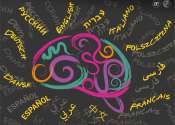Since language development is the crucial part of the human cognitive nature, understanding language development is an important aspect to understand the base and to recall its various components of linguistics. And as to their universality, the cognitive aspect of communication in language is understood as similar among primates, non-primates, and human in some aspects, and differs in other aspects in term of:
Language development is a process starting early in human life, when a person begins to acquire language by learning it as it is spoken and by mimicry. Children's language development moves from simple to complex[citation needed]. Infants start without language. Yet by four months of age, babies can read lips and discriminate speech sounds. The language that infants speak is called babbling.
Usually, language starts off as recall of simple words without associated meaning, but as children grow, words acquire meaning, with connections between words formed. In time, sentences start as words are joined together to create logical meaning. As a person gets older, new meanings and new associations are created and vocabulary increases as more words are learned.
Infants use their bodies, vocal cries and other preverbal vocalizations to communicate their wants, needs and dispositions. Even though most children begin to vocalize and eventually verbalize at various ages and at different rates, they learn their first language without conscious instruction from parents or caretakers. In fact research has shown that the earliest learning begins in utero when the fetus can recognize the sounds and speech patterns of its mother's voice.









